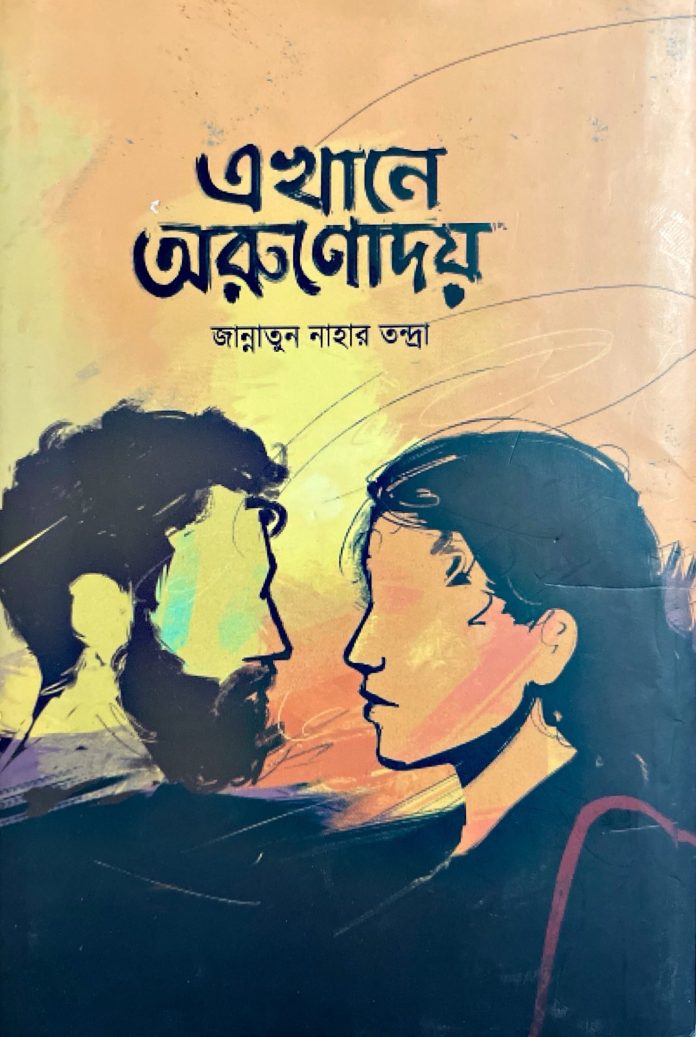Even this morning, the TV is up and running at Rasu’s tea stall in Tiorbila Bazaar. A gentle breeze is blowing all around. The banyan tree with paved sides, adjacent to the shop, has its roots almost touching the ground, and on both sides of the road stand unknown ancient trees that have witnessed many stories of bloodshed. Two roads converge here, forming a corner like a triangle. Rashu had to take the box TV out of the small kiosk of his shop today. A blue plastic sheet has been laid beneath the banyan tree for people to sit and enjoy the game. These are the people of this village, all wearing worn-out clothes. Regardless of their attire, everyone has a handloom towel draped over their shoulder; their teeth are stained from chewing betel leaves, and expressions of smiles or excitement can be seen on their faces while watching the game. Some shout excessively in excitement, unable to accept a foul by their favorite team’s player, and curse the opposing team. Some argue with the referee about why their team wasn’t given a penalty. Others chime in, saying, “Oh Man! you just understand the game like a horse egg!” When the arguments get heated to such a point, even the warm rice and egg poach they had for breakfast, gets digested within an hour, then they solely rely on Rasu’s tea.
Rasu’s two sons work relentlessly in the shop during this hour skipping school. Water boils in the kettle, blackened from burning over the wood fire, and milk simmers in another. One son washes the tea cups with hot water, while the other serves tea to the spectators sitting on the blue plastic sheet. Meanwhile, Rasu’s wife, who complains of her chronic back pain now and then, drives Rasu crazy every night. Again, as soon as the dawn breaks, she counts the eggs laid by their pet ducks. Then she starts grinding the spices for the chickpeas soaked overnight. The pungent flavor of braised onions and garlic in the chickpea curry spreads like the aroma of spicy meat. Many who come to watch the match can’t leave without having this delicacy. Sometimes, they also snack on spicy puffed rice. The paddy in the fields hasn’t been harvested yet. On this autumn morning, though the men find some idle time in their hands, the women of the house have chores to do.
Tutul is feeling hungry. As soon as he wakes up, it feels like even the needle inside his stomach is stirring restlessly like a hamster. Even though washing his face reduces his head’s throbbing pain a bit, his mood remains dull until food enters his tummy. Today, upon arriving at Rasu’s shop and seeing Motiar sir, Tutul moves aside. He is still scared of Motiar sir. The man, with his round belly and plump appearance, has a very irritable mood. It seems like sir is going to school today, Tutul notices him buying betel leaves. Sir also checks the match score while chewing betel leaves with lime at the tip of his tongue.
As a part of his daily routine, Motiar sir, right after his morning mouthwash, waits with a cane for his morning batch of students. In the morning, he has a cup of tea and puffed rice in front of the students. After teaching the morning batch of students, he eats rice and goes to school at ten with the same cane. During Tutul’s school years, sir would hit him with that cane at least once daily. The cane would transmit the burning sensation through his thin shirt to his back, though eventually, both Tutul and his back got somewhat used to it. Lifting one end of his lungi slightly and rushing towards the students like a storm sir would say, “You useless kids haven’t touched the books as always?” As soon as he ended talking he landed the cane on Tutul’s back several times, as if he were to enforce learning through beatings.
All the boys are high school students, yet sir wouldn’t hesitate to raise his hand on them. Tutul would stand quietly with his head down, his stomach still calling out from hunger due to not eating before leaving home. Sometimes, the pain of hunger would bring tears to his eyes. Motiar sir would think maybe he had hit him too hard that day. Then he would go patting him on the back and say, “You wouldn’t have been hit, you scoundrel, if you studied properly.” The language Sir used was never polite. Many were more afraid of his verbal jabs than his cane. The students couldn’t stand him for his foul mouth. But these are the village folks, using slang and cussing is a necessary part of their language. As a person, Motiar sir isn’t too bad, although his termite mound-shaped high nose, where a black-framed glass sits, makes his gaze intimidatingly shocking to the core of any student.
Tutul had good results from science in matriculation, sir was tutoring him. However, he flunked the intermediate exams twice before passing. However, during his undergraduate studies, he realized in the first year that nothing was getting through to his head anymore.
After Matiar sir left, Tutul sat near the front corner of the blue polythene sheet. He often dreams of eating rice to the fullest every morning if he ever gets a job like Miabhai Razzak. But the next moment he wonders if he would even eat rice, imagining a breakfast of bread, jelly, and eggs instead, as seen on Rasu’s TV.
As the game ends, Tutul’s hunger also fades, and he loses the desire to go home. The moment he reaches home, there will be orders to cut the hay and feed the cattle; these endless chores will continue all day. And then, with a sullen face, the middle sister-in-law, Sabina, hands over a plate of rice to Tutul. Barely swallowing the rice with a bit of curry, he rushes off to the field with the cows. After returning, he weaves thread into the fishnet. He also works in the field alongside the laborers, weeding the crops. And if he flunks his exams, he gets beaten pretty badly. He often feels the urge to run away from home. One day, He really wants to run away. As soon as He can gather some money, He plans to leave.
Tutul was born from his father Ismail’s second marriage. After his aunt died, his father married his mother, Aklima. However, people say that his father had an eye on his sister-in-law and allegedly killed his aunt using witchcraft, who left behind two sons and three daughters. Within forty days of his auntie’s death, Aklima- the future teenage mother of Tutul, came to their house wearing a printed pink sari and nose ring. His father’s older children never looked kindly upon his mother. When Tutul was eight, Bilkis was five, and Beli was just a baby, his father one day went down to urinate under the bael tree at dawn and died there, vomiting blood. He had throat cancer for a long time, and before dying, all their land and property were sold for his treatment. With whatever little was left, their joint family barely manages now. The villagers say this is the result of Ismail’s sins. Tutul never really felt the pain of losing his father. After he grew up, his father never called him close or spoke to him. His brother Razzak was in college then, staying in a lodging house, and started supporting the family by working at a clothes shop, while his middle brother Rashed worked in the fields. Yet, they lived almost like dependents in this joint family system. Tutul’s other three uncles live in separate households in the village, and their conditions aren’t much better either. Who has the time to tend to another’s needs in this relentless market?
After the match was over today, Tutul sneaked the house from the back. But his nephews Ratan and Swapan, the little scoundrels of his elder brother Rashed, instantly noticed. They were playing with a top under the banyan tree in the backyard and shouted upon seeing him, “Hey mom, the younger uncle is here.”
Rashed was weaving a fishing net in the courtyard. The bog is full of monsoon water, teeming with new fish. Many nearby ponds have overflowed. Setting up a bamboo trap can yield a good catch within a few hours. He was laying one mat of yarn after another, bending the mouth of the yarn, and biting the lip to pull the yarn tightly each time. Suddenly, a yarn snapped and pierced into his hand.
“Could you come here for a moment?”
Rashed’s wife, Sabina, was unloading rice from sacks inside the house to pound it in the mill, grumbling about the rodent problem, “How long have I been asking you to bring some poison, but does my word ever reach your ears?” Hearing Rashed’s call and coming out, she saw the scene – blood oozing from his finger. With a mix of anxiety and irritation on her face, she went inside to get a bandage, and while tying it, she said, “You end up doing fourteen tasks with one hand, of course, accidents will happen.”
The sun’s heat had diminished. The shadow of the tin roof had prolonged till the coconut tree at the front. At that very moment, Tutul slowly entered the house with his head bowed. Rashed had a towel wrapped around his head. Seeing Tutul, he wiped his face with one hand with the towel. While tying the last knot on the bandage, Sabina glanced at him sideways, “Little mother, you ask your son where he has been all day. I don’t want to discipline someone else’s child and turn out bad in their eyes.”
Aklima was seen to bring firewood for the night’s cooking in the open kitchen next to the courtyard. Her body was dusty, her hair was messy, and sweat rolled down her cheek. After bringing firewood and finishing the work in the cowshed, she was hurrying to take a dip in the pond. She was feeling itchy in her petticoatless, one-fold shari-clad body. Living in her co-wife’s sons’ household, she tries to satisfy everyone, almost like a maid. After a day’s hard work, Aklima’s face turned red and exhausted. She did cast a severe glance at Tutul but said nothing. In the courtyard, at the side corner of the kitchen, Beli was chopping vegetables. Looking at Beli, Sabina raised her voice, “Chop them all to the same size! How will the curry taste good if each piece is a different size? Why aren’t you focused on your work?”
Looking towards Tutul this time, Aklima, while tying the jute fibers in the bundle of straw, began with a sigh and asked, “Where were you?”
Tutul sat quietly on the porch, saying nothing, with his rough hair hanging low over his head. While tracing invisible patterns on the ground with his fingers, he said, “Ma, I want to eat rice.”
“Tell me first, where were you? Did you go to watch TV?”
Tutul remained silent. It was Sabina who answered Aklima.
“Why even ask! Can’t you tell by looking at his face what kind of super busy person’s work he did, and now he’s asking for food. If you don’t discipline him properly, he’ll turn completely disobedient! If we say anything, you act like there’s blisters on your skin!”
Aklima, breaking a large straw branch under her foot to make it smaller, responds:
“Discipline him, who’s stopping you?”
Before she could finish her sentence, she throws a stiff branch from the bundle at Tutul. “You good-for-nothing, stop annoying me. Walking around like an officer won’t fill your stomach with rice.”
Tutul quietly enters the house, puts on handloom towel, and then sits with a hay bundle. He holds the scissors flat and starts cutting the grass with intense strokes. He takes out all his anger and rebellion on the pile of hay. Aklima tells him, “I’ve kept rice on the rack in the kitchen, eat it and then cut it.”
Tutul doesn’t respond. His hunger is gone, dried up like the water left out in the midday sun. After cutting the grass, he goes to sit by the edge of the pond. Ratan and Swapan are also there. Somehow, they seem to understand the reason for their younger uncle’s silence. Nine-year-old Ratan asks, “Uncle, will you take me to the market this evening?” Tutul strokes his head affectionately and replies, “I will.”
The evening is approaching. The surroundings are gradually becoming quiet, except for the chattering of birds. Ducks are climbing out of the pond as if on their own duty. Next to Tutul’s house, there’s a pond with green moss on its surface, where the ducks graze. In another pond, there are nets set up for fish farming, but people can easily cross the small nets to bathe. A few palm trees stand on the bank of the pond. The palms are nearly ripe in this Bhadra month, dropping here and there. Tutul returns from the market after selling pumpkins, having bought sesame stick for Ratan and Swapan. The distance from home to the market is quite far, and all three of them have mud on their feet from the seasonal rain. Beli is herding the poultries into the cage, their clucking blending with the chirping of the birds. At this moment, Sabina screams from inside the house— “Oh my, a dog took the fish!” Beli rushes over in haste. Sabina glares at her with such intensity that if she could, she would have devoured her with her eyes right then.
“The man caught those fish with his injured hand, struggling all day. Don’t you people have any sense of responsibility? You wandered off, clattering away. You couldn’t even lift the fish pot to the rack or call someone for help. But when it’s time to eat, there’s never a shortage of people in this house.”
Despite thinking it over so many times, Beli couldn’t fathom how she forgot to lift the fish pot to the rack. Regret consumes her. With fear and guilt etched on her face, she tries to say something to acknowledge her mistake, but the words get stuck in her throat. Sabina cuts her off sharply, “What is Bhabi, huh? If there were any other person in your place with your laziness, I’d have thrown them out long ago.”
Beli remains silent, unable to find the words. She takes the remaining fish to the water pump to wash them, pressing down hard on the handle. The water gushes out like a strong waterfall. This time, however, Aklima doesn’t stay quiet. Her own children have grown up, so lately, even she finds the courage to speak up a little.
“Instead of continuously picking on my daughter, couldn’t you have told your own? Ruhi isn’t a little child nursing at her mother’s breast anymore, after all,” Aklima retorts.
Aklima’s retort feels like dropping eggplants into hot oil on Sabina’s already boiling temper. All of Sabina’s anger then lands squarely on ten-year-old Ruhi. She hits Ruhi a few times with the nearby jute sticks. Little Ruhi, not understanding anything, sits on the porch and cries.
Bashiran Buri, the elderly woman from the neighboring house, had been standing in the courtyard looking for lime. Dressed in a loosely wrapped saree without a blouse, her body showed the signs of age—stooped posture and whitish-yellowish hair that matched her almost white eyebrows. Her shaky voice is the first to raise an objection, “How could you be so cruel to strike such a tender child so harshly? Even a stepmother doesn’t beat someone like that!”
Beli heads to the pond with a water pitcher. She must fetch water before it gets dark. A slight fear nags at her, but she knows that Sabina will get even angrier if the water for the night’s cooking isn’t brought in time. How many hands does Beli have, after all? She’s been working since morning.
Bilkis is busy breaking snails so the ducks can feed them the next morning. She’s relieved to have stopped studying. Her mother keeps forcing her to go to school, but there’s no private tutor, and Bilkis can’t concentrate at home. She works all day and is too tired to study by evening. Yet, deep inside, she really wants to study. At fourteen, her body is changing rapidly, and so are her thoughts. She sometimes feels a wave of guilt over her, wondering why such thoughts cross her mind. Do good girls ever think about men like this?
Beli clears the algae from the pond and draws the water, lifting the heavy, full pitcher—almost too much weight for her adolescent body. The villagers use pond water for cooking, as the well water is full of iron, which turns the rice and lentils black. As she returns after collecting water and reaches the banana tree, she notices that the man is still standing there today, wearing the same checkered shirt. Even in the dim light, it’s clear he’s staring at her. As she passes by, he says, “Listen.” Without replying, Beli quickens her pace. She hears the man’s footsteps behind her, following closely. Out of fear, Beli felt as if the way home was very far.


